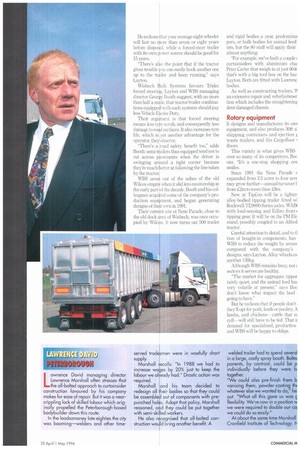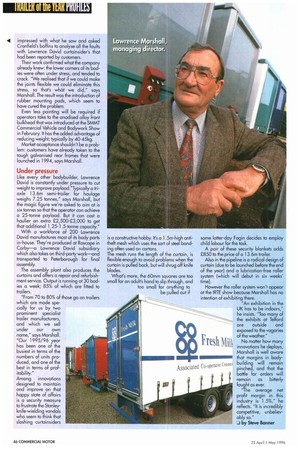L awrence David managing director Lawrence Marshall often stresses that the
Page 47

Page 48

If you've noticed an error in this article please click here to report it so we can fix it.
all-bolted approach to curtainsider construction favoured by his company makes for ease of repair. But it was a nearcrippling lack of skilled labour which originally propelled the Peterborough-based bodybuilder down this route.
In the loadsamoney late eighties the city was booming—welders and other time
served tradesmen were in woefully short supply.
Marshall recoils: "In 1988 we had to increase wages by 20% just to keep the labour we already had." Drastic action was required. Marshall and his team decided to redesign all their bodies so that they could be assembled out of components with prepunched holes Adopt that policy, Marshall reasoned, and they could be put together with semi-skilled workers.
He also recognised that all-bolted construction would bring another benefit. A
welded trailer had to spend several in a large, costly spray booth Bolted ponents, by contrast, could be p individually before they were b together.
"We could also pre-finish them b vanising them, powder-coating thd whatever else we wanted to do," he out. "What all this gave us was c flexibility. We're now in a position w we were required to double our cal we could do so easily." At about the same time Marshall Cranfield Institute of Technology. I-' • impressed with what he saw and asked Cranfield's boffins to analyse all the faults with Lawrence David curtainsider's that had been reported by customers. Their work confirmed what the company already knew: the lower corners of its bodies were often under stress, and tended to crack. 'We realised that if we could make the joints flexible we could eliminate this stress, so that's what we did," says Marshall. The result was the introduction of rubber mounting pads, which seem to have cured the problem.
Even less painting will be required if operators take to the anodised alloy front bulkhead that was introduced at the SMMT Commercial Vehicle and Bodywork Show in February. It has the added advantage of reducing weight; typically by 40-45kg. Market acceptance shouldn't be a problem: customers have already taken to the tough galvanised rear frames that were launched in 1994, says Marshall.
Under pressure
Like every other bodybuilder, Lawrence David is constantly under pressure to cut weight to improve payload."Typically a triaxle 13.6m semi-trailer for haulage weighs 7.25 tonnes," says Marshall, but the magic figure we're asked to aim at is six tonnes so that the operator can achieve a 25-tonne payload. But it can cost a haulier an extra 22,500-£3,000 to get that additional 1.25-1.5-tonne capacity."
With a workforce of 200 Lawrence David manufactures most of its body parts in-house. They're produced at Roscope in Corby—a Lawrence David subsidiary which also takes on third-party work—and transported to Peterborough for final assembly.
The assembly plant also produces the curtains and offers a repair and refurbishment service. Output is running at 30 bodies a week; 85% of which are fitted to trailers.
"From 70 to 80% of those go on trailers which are made specially for us by two prominent specialist trailer manufacturers, and which we sell under our own name," says Marshall. "Our 1995/96 year has been one of the busiest in terms of the numbers of units produced, and one of the best in terms of profitability,"
Among innovations designed to maintain and improve on that happy state of affairs is a security measure to frustrate the Stanleyknife-wielding vandals who seem to think that slashing curtainsiders
is a constructive hobby. It's a 1.5m-high antitheft mesh which uses the sort of steel banding often used on cartons. The mesh runs the length of the curtain, is flexible enough to avoid problems when the curtain is pulled back, but will shrug off knife blades.
What's more, the 60mm squares are too small for an adult's hand to slip through, and too small for anything to be pulled out if some latter-day Fagin decides to employ child labour for the task.
A pair of these security blankets adds £850 to the price of a 13.6m trailer. Also in the pipeline is a radical design of curtain (due to be launched before the end of the year) and a lubrication-free roller system (which will debut in six weeks' time).
However the roller system won't appear at the IRTE show because Marshall has no intention of exhibiting there. "An exhibition in the UK has to be indoors," he insists. "Too many of the exhibits at Telford are outside and exposed to the vagaries of the weather."
No matter how many innovations he deploys, Marshall is well aware that margins in bodybuilding will remain pinched, and that the battle for orders will remain as bifterly fought as ever. "The average net profit margin in this industry is 1.5%," he reflects. "It is incredibly competitive, unbelievably so."
by Steve Banner
























































































































